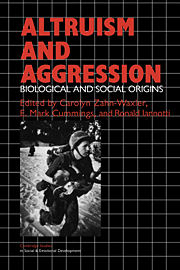Book contents
- Frontmatter
- Contents
- List of contributors
- Editorial preface
- Introduction: Altruism and aggression: problems and progress in research
- Part I Biological, sociobiological, and ethological approaches to the study of altruism and aggression
- Part II Development, socialization, and mediators of altruism and aggression in children
- 5 A conception of the determinants and development of altruism and aggression: motives, the self, and the environment
- 6 Early organization of altruism and aggression: developmental patterns and individual differences
- 7 Aggression and altruism: a personality perspective
- 8 The socialization of prosocial behavior: theory and reality
- 9 Social-interactional patterns in families of abused and nonabused children
- 10 Naturalistic observation of cooperation, helping, and sharing and their associations with empathy and affect
- 11 Social information-processing variables in the development of aggression and altruism in children
- Conclusions: lessons from the past and a look to the future
- Index of names
- Index of subjects
5 - A conception of the determinants and development of altruism and aggression: motives, the self, and the environment
Published online by Cambridge University Press: 04 August 2010
- Frontmatter
- Contents
- List of contributors
- Editorial preface
- Introduction: Altruism and aggression: problems and progress in research
- Part I Biological, sociobiological, and ethological approaches to the study of altruism and aggression
- Part II Development, socialization, and mediators of altruism and aggression in children
- 5 A conception of the determinants and development of altruism and aggression: motives, the self, and the environment
- 6 Early organization of altruism and aggression: developmental patterns and individual differences
- 7 Aggression and altruism: a personality perspective
- 8 The socialization of prosocial behavior: theory and reality
- 9 Social-interactional patterns in families of abused and nonabused children
- 10 Naturalistic observation of cooperation, helping, and sharing and their associations with empathy and affect
- 11 Social information-processing variables in the development of aggression and altruism in children
- Conclusions: lessons from the past and a look to the future
- Index of names
- Index of subjects
Summary
The time has come to develop theories and conduct research that jointly consider the most basic, central elements of moral conduct: aggression and altruism. How are such behaviors determined? What influences contribute to their occurrence? How do personal characteristics develop that make their occurrence more or less likely? A simple theory that focuses on one or two elements will necessarily be inadequate. What might be the central elements of a comprehensive theory of the development and determinants of aggression and altruism?
A major purpose of this chapter is to consider socialization and childhood experiences that contribute to the development of aggressive and altruistic behaviors. It is not possible, however, to consider their development meaningfully without understanding how such behaviors are determined. What psychological processes promote and inhibit aggression and altruism? What personal characteristics are likely to give rise to these psychological processes and to influence whether they gain expression in behavior? A reasonable strategy is to specify these characteristics and then to proceed to consider their sources in children's socialization and experience (Atkinson, 1981; Staub, 1979).
In order to understand the determinants of altruism and aggression, we have to consider three classes of influences: (1) environmental conditions that instigate or activate such behavior (e.g., someone's distress or an insult or attack), (2) personal characteristics that affect how people respond to external activators, and can also result in internal activation or initiation of altruism or aggression (e.g., empathic capacity, values, the self-concept), and (3) psychological states (e.g., empathy, anger) that are the result of activation and are the direct determinants of ways of dealing with it.
- Type
- Chapter
- Information
- Altruism and AggressionSocial and Biological Origins, pp. 135 - 164Publisher: Cambridge University PressPrint publication year: 1986
- 32
- Cited by



